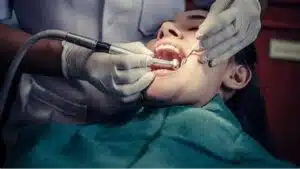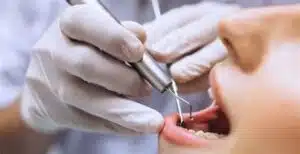
September 9, 2025
When the dentist mentions you may need a tooth pulled, one of the first questions that comes to mind is how long does a tooth extraction take. Timing matters because it helps patients plan their day, reduce worry, and feel more in control of the procedure. For many, the thought of sitting in a chair for hours can feel overwhelming, so knowing the typical timeframe brings peace of mind. The truth is, most extractions are quicker and smoother than people expect.
With today’s dental techniques and gentle care, extractions are usually completed in a matter of minutes once the tooth is ready. In this blog, we’ll break down what affects the duration, what to expect during the appointment, and how recovery fits into the bigger picture—so you’ll have a clear idea of the process from start to finish.
How Long Does a Tooth Extraction Take on Average?
For most patients, the biggest concern before scheduling treatment is the average amount of time spent in the chair. So, what is the average time for a tooth extraction process? The answer depends on whether the extraction is straightforward or more complex.
A simple extraction, which is usually done on a tooth that’s fully visible and easy to access, often takes between 20 to 40 minutes. This includes numbing the area, loosening the tooth, and removing it safely. These cases move fairly quickly, and most patients are surprised by how efficient the process feels once it begins.
A surgical extraction, however, may take longer. This approach is necessary for impacted teeth, broken roots, or wisdom teeth buried under the gums. In these cases, the dentist may need to make a small incision or remove bone around the tooth. That’s why the average time for a tooth extraction can extend up to an hour or more.
While times vary, what’s most important is that each step is taken carefully to protect your comfort and ensure proper healing afterward. The actual hands-on part is shorter than most expect, especially when handled by an experienced dental team.
What Decides How Long a Tooth Extraction Takes?
Many patients wonder not only how long does a tooth extraction take, but also what makes the timing different from one case to another. Several key factors play a role in whether the procedure is quick or requires more time and care.
One of the most important elements is the type of tooth being removed. Front teeth with single roots are generally easier and faster to extract, while molars with multiple roots take longer. If the impacted tooth is stuck under the gum or bone, the dentist may need to perform a surgical extraction, which can take more time.
A patient’s overall health can also affect the procedure. Conditions like gum disease, bone density issues, or bleeding disorders may require additional steps during the tooth extraction process. In addition, a person’s age and healing capacity influence how carefully the dentist must proceed.
Finally, the type of anesthesia used has an impact. Local anesthesia is quick to administer, while sedation or general anesthesia involves preparation, monitoring, and longer recovery in the chair.
All these factors combined determine how long your extraction will take. By evaluating these details in advance, your dentist can give you a clear expectation before starting the procedure.
How Long Does It Take to Extract a Tooth in Different Cases?
The time it takes for an extraction isn’t the same for every patient. How long does it take to extract a tooth depends largely on whether the procedure is simple or surgical.
A simple extraction is the more common type. This is done when the tooth is visible above the gum and can be easily reached with dental tools. After numbing the area, the dentist uses gentle pressure to loosen the tooth and remove it. From start to finish, most simple extractions fall in the range of 20 to 40 minutes, making them fairly quick and predictable.
A surgical extraction is more complex and takes longer. This method is necessary when a tooth is impacted, broken, or hidden under gum or bone tissue. In these cases, the dentist may need to make a small incision, section the tooth into pieces, or remove a bit of surrounding bone. As a result, surgical procedures can last 45 minutes to over an hour, depending on the difficulty.
While surgical extractions require more time and care, both types are designed to prioritize patient comfort and ensure a safe outcome.
How Long Does a Dental Extraction Take From Start to Finish?
Patients often wonder not just about the procedure itself, but how long does a dental extraction take when you include every step of the appointment. While the actual removal is only part of the visit, the overall process is designed to ensure comfort and safety.
It begins with a pre-operative consultation, where your dentist reviews your medical history, explains the procedure, and answers any questions. This stage usually takes 10–15 minutes, but it sets the foundation for a smooth experience.
Next comes the numbing process. Local anesthesia is administered to block pain, which can take 5–10 minutes to become fully effective. For patients receiving sedation, extra time may be needed for preparation and monitoring.
The extraction itself is the shortest phase for many patients. A straightforward tooth may only take 10–20 minutes to remove, while more complicated cases can extend closer to 30–40 minutes. Surgical extractions, especially for impacted teeth, can last longer, but the dentist proceeds carefully to protect surrounding tissue.
Finally, there is immediate aftercare. Your dentist will place gauze to control bleeding, review recovery instructions, and may prescribe medication if necessary. This wrap-up portion typically adds another 10–15 minutes before you leave the office.
Altogether, from the start of the consultation to walking out the door, a dental extraction appointment may last 45 minutes to over an hour. Knowing the steps in advance helps patients feel more prepared and reassured about the process.
How Much Time Does a Tooth Extraction Take to Heal Completely?
Many patients ask not only about the typical time for a tooth removal in the dental chair, but also how long it takes for the mouth to fully recover. Healing happens in stages, and knowing what to expect can make the process less stressful.
The first stage begins within 24 hours, when a blood clot forms in the socket. This clot is crucial, as it protects the bone and nerves underneath while healing begins. During this period, following your dentist’s instructions—such as avoiding straws or vigorous rinsing—helps keep the clot stable.
By three to five days, swelling and tenderness usually start to ease, and the gum tissue begins to close around the extraction site. Most patients feel significantly more comfortable at this point and can resume light daily activities without much concern.
Over the next one to two weeks, the gum tissue continues to repair itself, sealing the socket. While the surface looks healed, deeper tissues are still rebuilding.
Finally, bone healing takes longer—several weeks to a few months depending on the tooth and overall health. Although the full process can be gradual, most people feel well enough to return to normal routines within days.
Proper aftercare ensures that healing stays on track and complications are avoided.
Tooth Extraction Duration for Wisdom Teeth
Patients often ask about the tooth extraction time frame when it comes to wisdom teeth, since these molars are known to be more complex than others. The procedure length depends heavily on whether the tooth is fully erupted or impacted beneath the gums.
A straightforward wisdom tooth extraction where the tooth has erupted normally can be completed in about 30 minutes. However, if the tooth is impacted, positioned at an angle, or trapped under gum and bone, the procedure may extend to 45 minutes or longer. In these cases, the dentist may need to create a small incision or remove bone to reach the tooth safely.
Anesthesia choices also affect overall timing. Local anesthesia is quick, but sedation or general anesthesia requires additional preparation, monitoring, and recovery before the patient can leave.
Healing is another factor. Wisdom teeth are at the very back of the mouth, an area that tends to swell more and takes extra time to close. While most patients feel better within a few days, full gum healing often takes one to two weeks.
These added steps explain why wisdom tooth extractions generally require more time and care than other teeth.
Tooth Removal Procedure Length: What to Expect Ahead of Time
Being prepared makes a big difference in both comfort and timing. Patients often ask how long does a tooth extraction take overall, and the answer can be shorter when you follow a few simple steps before and after the procedure.
Start with pre-visit preparation. Eating a light meal (if not under sedation), arranging a ride home, and wearing comfortable clothing can help the appointment go smoothly. Share your full medical history with your dentist so there are no delays once you’re in the chair.
Good oral hygiene in the days leading up to the extraction also matters. Brushing and flossing as directed lowers bacteria levels, reducing the risk of infection and speeding healing.
Finally, plan for rest after the procedure. Keeping your schedule light for 24–48 hours allows the blood clot to stabilize and your gums to begin healing quickly. The more prepared you are, the smoother and faster the entire experience feels.
Final Thoughts
When all is said and done, how long does a tooth extraction take depends on the type of tooth, the complexity of the case, and the anesthesia chosen. For most people, a simple extraction lasts just 20–40 minutes, while surgical cases such as wisdom teeth can take closer to an hour or more. Although the timing varies, modern dental techniques ensure the process is efficient and designed to keep patients comfortable from start to finish.
It’s also important to remember that recovery plays its own role. While gum tissue often begins healing within days, full healing takes longer, and following aftercare instructions helps prevent complications.
If you’re feeling anxious about timing, talking with your dentist is the best way to set clear expectations. With preparation, expert care, and proper aftercare, a tooth extraction can be much quicker and easier than most patients imagine.
Book Your Tooth Extraction with Confidence
Stop worrying about the average time for a tooth extraction and take the next step toward relief today. At Dentistry at Marysville, our skilled team makes extractions efficient, safe, and as comfortable as possible so you can get back to feeling your best faster.
Don’t wait until pain or discomfort gets worse. Secure your spot, get answers tailored to your needs, and experience expert dental care right here in Marysville.
New Patient Specials
New patients to Dentistry Marysville are invited to take advantage of one of our first-time visitor specials.
To claim the offer, screenshot or print the coupon and show it at your initial appointment.
$149 New Patient Special Plus $100 Off Your Second Office Visit*
*New patients only. A $369 value. Cannot be combined with other offers or insurance.
10% Off Cash Discount on All Dental Services*
*Cannot be combined with other offers or insurance.
$149 New Patient Special Plus Professional Teeth Whitening for ONLY $350*
*New patients only. Cannot be combined with other offers or insurance.
$89 New Patient Special* Limited Exam & X-rays
*New Patients Only. Cannot be combined with other offers or insurance.




